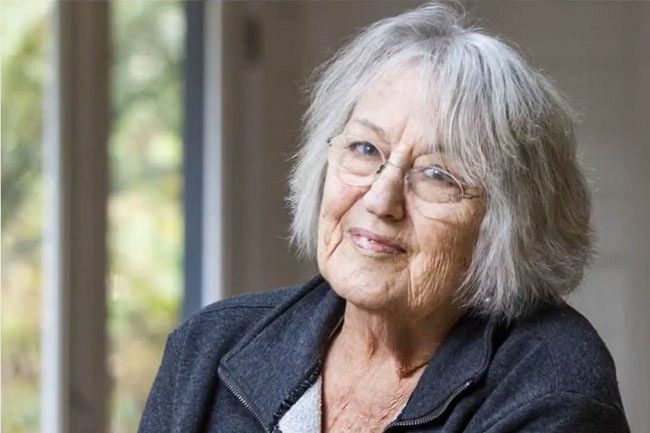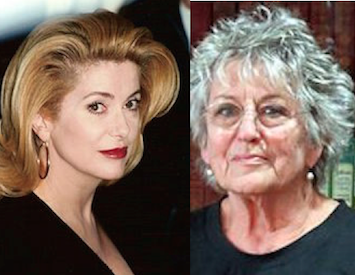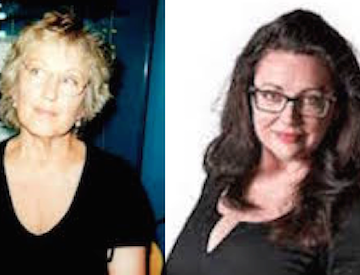Whatever she talks about and whenever she does it, Germaine Greer is impressive.
Her latest media outing is an interview for British-American journalist Louis Theroux’s podcast, recorded at the end of 2023 when Greer was still 84. That followed hard on the heels of a shorter interview by David Wenham recorded for ABC TV.
Wenham’s was much better. It might have been because, for that interview, Greer had travelled from the Arcare aged-care home on the edge of Castlemaine, 100 kilometres north of Melbourne, to do the interview in person. It might have been that she was prepared for the questions (although she hadn’t, by the looks of it, been shown the footage the ABC used of her from as early as the 1960s).
But I think it had more to do with the quality of the interviewer, or rather, as Theroux is much admired and Wenham better-known as an actor, with their attitude towards their subject. Wenham respected her, whereas Theroux treated her like a curiosity. Like a vintage car. A once-fashionable hairdo. Sclerotic celebrity.
We can ask why this is so from many angles. The backgrounds and careers of the interviewers, for starters, may have contributed to making them different kinds of people. There are also the expectations of the supposed audiences for, on one hand, Theroux’s podcast which tries to be new-media current, and Wenham’s ABC TV format, which is carefully produced and also pitched to an older audience.
The most unsuccessful parts of the Theroux interview sound like a middle-aged man (he’s 53) trying to be relevant, while Wenham, five years older, just looks and sounds interested.
Greer, who does like masculine attention (and even makes a stab at preening when she answers a question about older women attracting younger men), is totally tolerant of both interviews, although her trademark brusqueness is still employed occasionally.
I live more or less down the road from Arcare, where her arrival a few years back was met with a ripple of excitement, and one of the first sightings of her was in an Italian coffee shop where people of Greer’s vintage love to meet and talk.
Greer has mobility issues, but she’s hard to miss. And when someone had the temerity to approach and accuse her, in the way fans do, of being Germaine Greer, she denied it.
She started talking about old age about eight years ago and it must have become clearer to her what she herself was facing. It’s usually about Germaine when she launches into her research on a topic. Remember her lamenting not having children and then launching into a defence of hormone replacement therapy? She was, at one stage, all about Indigenous land rights, which seemed to be connected to her own love of the land and attempts to go back to living bush.
She’s just so quotable, which is maybe why she talks in sound bites and also why her pronouncements have become less useful. In 2015, for International Women’s Day, she was on a panel where she said: “Give me the right to grow up, let me age. In our society, elder women have no respect.” She also talked about how the workers in aged care are exploited, so you’d imagine she’s pleased with the news just out that these workers are due a pay rise.
Shrewd about when and to whom she grants interviews, Greer spoke to The Australian two years ago about her experience as an “inmate” of the care home. If you were to visit this particular place, you’d maybe find that a bit odd since the units are very private, elegantly landscaped, with optional shared spaces, a café open to the public and discreet staff — more like a genteel motel than a prison, you might think.
She mentioned again how she feels constricted in her movements when she spoke to Theroux and yearned to go bush — again, slightly odd because Castlemaine is threaded through with bush and this facility is actually more in the bush than in town. Wonderfully, Greer mentioned her delight in the big dragonflies attracted by the garden pond at her aged-care home.
When she spoke with Wenham, she was asked about Clive James and she emotionally recalled speaking with him before he died about his longing to return “home” to Australia. The skies, she said, you don’t forget.
Theroux’s questions addressed the usual controversies and this was one of the reasons the Mamamia podcasters – Holly Wainwright, Mia Freedman and Jessie Stephens – were critical of his interview. Wainwright and Freedman are, like Theroux, in their 50s, a generation that maybe still thinks of themselves as young or at least in touch with what it’s like to be young.
According to these women, Greer was “not on her game” talking to Theroux, but “she’s lived an extraordinary life” and they were upset because “old people are mocked all the time” and they saw a bit of that kind of disrespect at work here. They asked each other about the ethics of recording someone whose age made it less likely they were able to give their best responses on the spot: “Your brain works differently because of your age.”
The discomfort of these women hearing a once (still?) famous feminist hero being baited by a man who began the interview by mentioning he’d “dipped into” The Female Eunuch is well expressed in their chatty but well-shaped podcast. Greer has earned the right to “open herself to that criticism”, they agreed, mentioning the flak Greer received when she weighed in on transgender women.
Both Wenham and Theroux asked her about that and Greer said she’s listening, rather than commenting, these days. “Time I shut up, is what I think.”
So, why these two interviews on the cusp of her 85th birthday? That’s the question I wish she’d been asked.
Another question that might have been asked is, “What are you writing now?” Greer is not an academic (as she’s referred to in the preface to the 50th anniversary edition of The Female Eunuch). Nor is she what we might call a professional feminist.
She tells the story about how a lunch meeting rave about the treatment of women to the influential head of Random House, the late Sonny Mehta, led to him saying that’s the book he wanted her to write — and the rest is history.
It wasn’t her idea to call it second-wave feminism, but she was clever enough to seize the moment, brilliant enough to write with such emphatic flair and charismatic enough to bring women with her.
It was perhaps the approval of men that most encouraged her and maybe still does. She very much enjoys the memories of her liaisons with famous men, still warming her very big opinion of herself by the embers of that titillating fire.
Although these interviews are flawed, although they might be seen as missed opportunities, they are absorbing for such moments as when, recalling how she up and left her family, blaming her mother, she says, “She nearly lost me, which probably would have been a stroke of luck”. Followed up by, “I ran away and began a lifetime of being a bolter”.
She might not have been able to explain what she meant by those comments if she’d been asked, but there’s a poignant wistfulness there that is intriguing.
She also talks about the women in the care home, how they’ve “got their own style, their own fashion, generally pretty fit” and comments that she sees women “who have been through the marriage mill” but is touched to see them visited by their daughters.
There it is again, the beckoning question about what she might be writing as she watches the dragonflies and the lives around her. And what about the women who are being watched? This may not be the kindest thing to say, but wouldn’t it be something if one of the other “inmates” of Castlemaine’s Arcare home was taking notes in preparation for an essay all about Germaine Greer?
Rosemary Sorensen was a newspaper, books and arts journalist based in Melbourne, then Brisbane, before moving to regional Victoria, where she founded the Bendigo Writers Festival, which she directed for 13 years.
 This work is licensed under a Creative Commons Attribution-NonCommercial-NoDerivs 3.0 Australia License
This work is licensed under a Creative Commons Attribution-NonCommercial-NoDerivs 3.0 Australia License
Support independent journalism Subscribe to IA.















